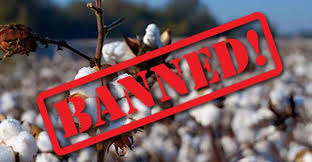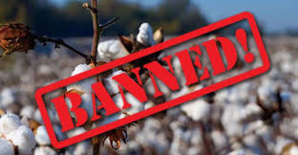All imports that have any cotton or tomato products originating in China’s Xinjiang region will be banned in the United States, the government has said, over charges that the Chinese government is using at least 1 million members of the country’s Uyghur ethnic minority into forced labour to produce those products. It is estimated that the people from the Uyghur are being held in detention camps which the Chinese government calls teaching institutions.
This important ban order by the US government is the latest issued to put pressure on China to stop its campaign of oppression of the predominately Muslim Uyghurs with allegations that the Chinese authorities are conducing genocide of the Muslim Uyghurs.
The order is aimed to prevent American shoppers from unwittingly buying products that have been made through forced labour.
Accounting for as much as 85 per cent of the total cotton production of China, Xinjiang is the most important region in the cotton industry of the country. It is also a major producer of tomato. Ample evidence has been accumulated by researchers and authorities that point to the fact that Muslim Uyghurs are being forced to work in the fields as well as in the factories that provide the raw material for these industries.
In December, an order to detain cotton and cotton products tied to Xinjiang Production and Construction Corps had already been issued to its Customs and Border Protection (CBP) by the US government. The Xinjiang Production and Construction Corps is a large paramilitary group that has links to the camps.
Brenda Smith, executive assistant commissioner of the Office of Trade at CBP, said that the order has already yielded in the seizure of 43 shipments whose combined value is more than $2 million.
The basis of the new order is information that “reasonably indicates” involvement and use of forced labor in the process of production of the banned goods, said the CBP. The targeted items include all those that use cotton or tomato products from Xinjiang even if those products are assembled or finished elsewhere outside of Xinjiang prior to being exported to the US. Hence the targeted products can range from textiles to canned tomatoes and tomato sauce.
The stakes are potentially the highest for the fashion companies.
According to the estimates of the Worker Rights Consortium (WRC), a labor-rights watchdog, every year more than 1.5 billion garments containing materials from Xinjiang is imported by US brands and retailers which is equivalent to more than $20 billion in total annual retail sales.
“Every one of these garments is now barred from entry,” it said in a statement applauding the new CBP order.
On the other hand, reports also stated that a ban similar to that of the US will be announced by the United Kingdom. Reports suggest that the UK is also set to announce a ban on importing products that are suspected of having been made or having products that were produced using forced labour in China’s Xinjiang province.
The treatment of Uygur Muslims in Xinjiang has been criticized by the UK previously as the government cited evidence that point out forced labor being used to produce cotton and called such evidence to be “deeply troubling”.
China has denied allegations of forced labour.
(Source:www.thescmp.com & www.qz,com)
This important ban order by the US government is the latest issued to put pressure on China to stop its campaign of oppression of the predominately Muslim Uyghurs with allegations that the Chinese authorities are conducing genocide of the Muslim Uyghurs.
The order is aimed to prevent American shoppers from unwittingly buying products that have been made through forced labour.
Accounting for as much as 85 per cent of the total cotton production of China, Xinjiang is the most important region in the cotton industry of the country. It is also a major producer of tomato. Ample evidence has been accumulated by researchers and authorities that point to the fact that Muslim Uyghurs are being forced to work in the fields as well as in the factories that provide the raw material for these industries.
In December, an order to detain cotton and cotton products tied to Xinjiang Production and Construction Corps had already been issued to its Customs and Border Protection (CBP) by the US government. The Xinjiang Production and Construction Corps is a large paramilitary group that has links to the camps.
Brenda Smith, executive assistant commissioner of the Office of Trade at CBP, said that the order has already yielded in the seizure of 43 shipments whose combined value is more than $2 million.
The basis of the new order is information that “reasonably indicates” involvement and use of forced labor in the process of production of the banned goods, said the CBP. The targeted items include all those that use cotton or tomato products from Xinjiang even if those products are assembled or finished elsewhere outside of Xinjiang prior to being exported to the US. Hence the targeted products can range from textiles to canned tomatoes and tomato sauce.
The stakes are potentially the highest for the fashion companies.
According to the estimates of the Worker Rights Consortium (WRC), a labor-rights watchdog, every year more than 1.5 billion garments containing materials from Xinjiang is imported by US brands and retailers which is equivalent to more than $20 billion in total annual retail sales.
“Every one of these garments is now barred from entry,” it said in a statement applauding the new CBP order.
On the other hand, reports also stated that a ban similar to that of the US will be announced by the United Kingdom. Reports suggest that the UK is also set to announce a ban on importing products that are suspected of having been made or having products that were produced using forced labour in China’s Xinjiang province.
The treatment of Uygur Muslims in Xinjiang has been criticized by the UK previously as the government cited evidence that point out forced labor being used to produce cotton and called such evidence to be “deeply troubling”.
China has denied allegations of forced labour.
(Source:www.thescmp.com & www.qz,com)






